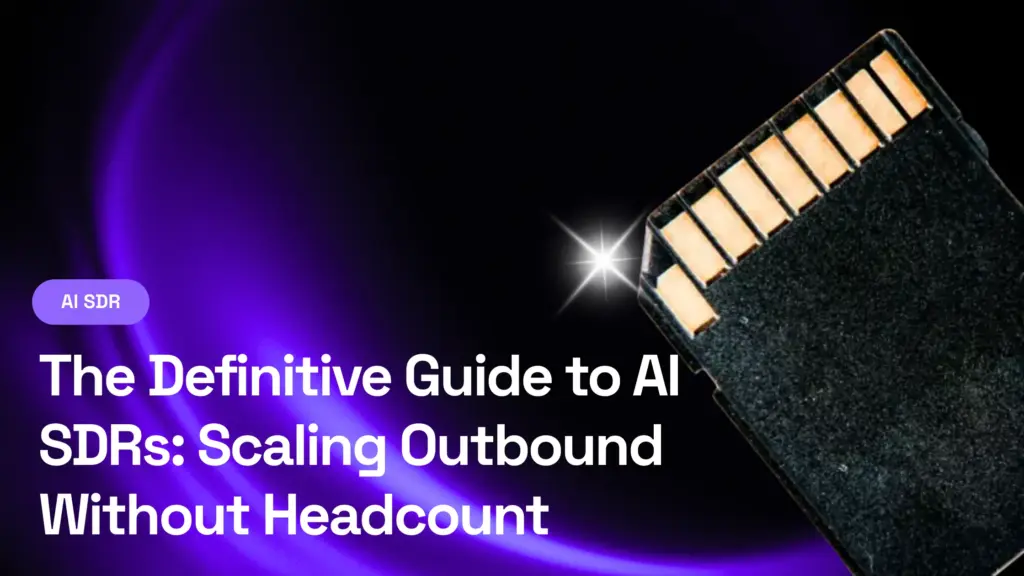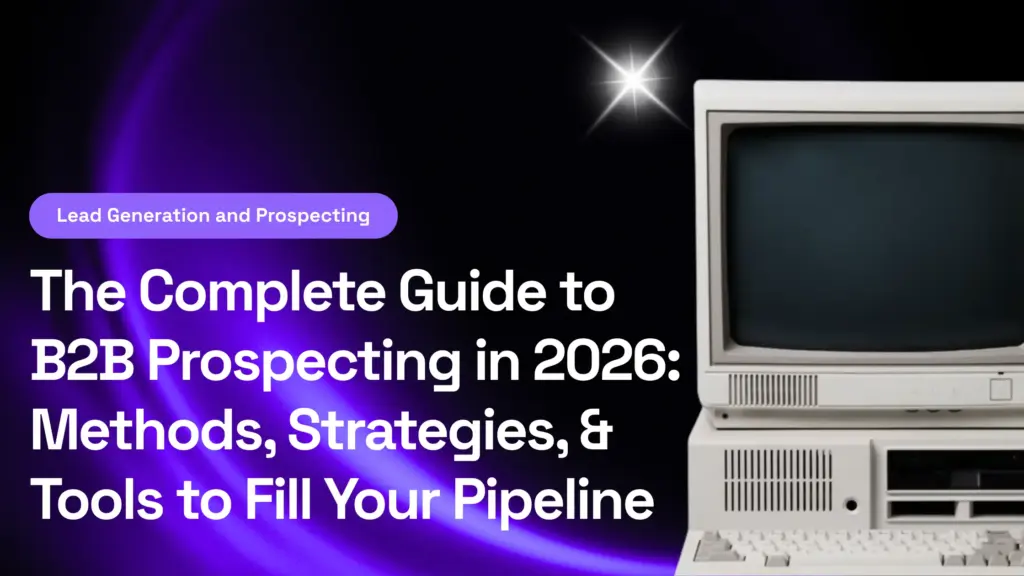Using clever algorithms, artificial intelligence lead scoring sorts through possible client data to identify which leads are most likely to produce sales. By concentrating on the most likely leads first, this clever sorting helps to streamline the sales process.
New technologies like the Internet of Things (IoT), blockchain, and augmented reality (AR) can make AI lead scoring even better by offering more exact predictions and deeper insights as they surface. Adopting these technologies is essential for companies trying to keep ahead and remain competitive in a digital environment accelerating by nature.
In this article, we’ll dive into how these cutting-edge technologies can transform lead scoring and propel businesses to the forefront.
The Evolution of AI in Lead Scoring
Allow us to travel down memory lane and observe how artificial intelligence has altered lead scoring. Recall the past when determining which leads were hot and which were not – more guesswork than science in those days? Sales teams would labor hours hand-sifting data in search of trends. Time-consuming and generally hit-or-miss, it was like searching for a needle in a haystack.
Later arrived the early days of artificial intelligence in lead scoring. It was like having a smart assistant with a faster numerical crunch than any human could do. We could suddenly examine tons of data points and have a better idea of which leads were worth looking at. Not ideal, though, even then. Many times stiff and unable to keep up with the continually shifting terrain of sales, these early systems
Now fast forward to right now! Lead scoring artificial intelligence has evolved to be so smart it nearly seems like a crystal ball. And that’s where instruments like AnyBiz find use. They have truly stretched the possibilities. AnyBiz, for example, is more than simply a lead scorer; it’s like having a nonstop sales crew always learning and adjusting.
AnyBiz distinguishes itself by using artificial intelligence lead scoring more human-like and understandable manner. It looks at subtle signals like how a possible buyer interacts with your website or responds to communications, not only at cold, hard facts. It’s like having a highly intelligent friend who can read between the lines and alert you, “Hey, this person seems really interested in what you’re selling!”
The great thing is that tools like AnyBiz have opened sophisticated artificial intelligence to companies of all kinds. Modern lead scoring benefits from you not being a tech powerhouse with a large IT staff. It’s leveled the playing field, allowing smaller companies the same firepower as their larger counterparts.
Related – Predictive Lead Scoring: How It Can Boost Your Sales Success
Leading Scoring Emerging Technologies Changing the Future of AI
Many new technologies are ready to transform our identification, assessment, and interaction with possible consumers as we head toward the horizon of artificial intelligence lead scoring. These developments should improve the accuracy, speed, and depth of lead scoring systems, therefore generating fresh chances for companies to maximize their marketing and sales campaigns.
Internet of Things (IoT)
For AI lead scoring systems, the Internet of Things (IoT) is poised to offer hitherto unheard-of abundance of data points. AI algorithms will learn more about consumer habits and preferences by leveraging the large network of linked devices, hence enabling more complex and accurate lead scoring models.
Blockchain
Blockchain technology could solve important issues with data integrity and openness inside artificial intelligence lead scoring. Blockchain could improve lead scoring algorithms’ dependability and inspire more confidence in the insights it produces by offering a safe and unchangeable record of consumer contacts and data.
Extended Reality (XR) – including AR and VR
Extended Reality (XR), which combines Virtual Reality (VR) with Augmented Reality (AR), creates fresh opportunities for consumer involvement and data collecting. By examining prospect interactions inside these immersive settings, artificial intelligence lead scoring systems could offer more comprehensive understanding of consumer intent and involvement degrees.
Edge Computing
Edge computing is poised to improve AI lead scoring systems’ security and speed. Edge computing will allow faster processing of lead data, maybe in real-time, while also solving data privacy issues by lowering the need to distribute sensitive information to centralized servers by bringing computational capability closer to the site of data collecting.
When combined with artificial intelligence lead scoring systems, these technologies could drastically raise lead qualification process accuracy, efficiency, and efficacy. They promise to give sales and marketing teams more complete, real-time insights into prospect behavior and intent, therefore supporting more focused and effective customer interaction methods. Let’s explore all these technologies in more detail.
IoT and AI Lead Scoring
Combining artificial intelligence lead scoring with the Internet of Things (IoT) is like giving your sales team superhuman ability. Let’s dissect how this dynamic team is altering the lead score game.
Let’s start with discussing using information from linked devices. From our phones and watches to our refrigerators and thermostats, smart devices abound in the modern world. Every one of these devices is continuously gathering information about our choices, behavior, and way of life. This is a veritable gold mine for artificial intelligence lead scoring.
Say you are selling upscale coffee makers to companies. IoT allows your artificial intelligence system to access data from currently running smart coffee machines. It may be found that a given office is making more coffee than normal or that their machine shows wear and tear. The artificial intelligence system flags this company as a hot lead using this kind of real-world, real-time data. Nowadays, it’s not only conjecture; it’s hard data about a possible need.
Still, it goes beyond just the consumption of products. IoT devices can offer a background that helps lead scoring to be more accurate. Location data from cell phones, for example, can reveal that a possible customer visits rivals’ stores quite regularly. Smart building sensors might also show that a business is growing its office space, which would be obvious evidence it could require more goods or services.
Let us now explore real-time tracking and scoring. Here things get pretty fascinating. Typical lead grading depends on past performance; what a lead did last week or the previous month? But we’re talking about up-to-date findings when IoT and artificial intelligence cooperate.
For instance, suppose you are following a lead that has expressed some interest in your product. Their smart gadget suddenly says they have visited one of your physical stores. Your artificial intelligence system can rapidly increase their lead score and perhaps even send a customized offer straight there and then to their phone. It’s like being able to react before your client even asks a question, reading their mental state.
The ability of artificial intelligence to instantly process and make sense of all this IoT data defines the actual power here.
Blockchain in Lead Scoring
Though it seems like something out of a cyberpunk book, blockchain technology is causing waves in the lead scoring space. Let’s examine how this technology is upsetting things.
Ensuring Data Integrity and Transparency
Imagine a day when every bit of information on your leads you could rely upon. Blockchain offers something like that. Like this:
✅ Immutable Records
Once data is on the blockchain, it’s there for good. No more worrying about data being tampered with or accidentally changed.
✅ Transparent History
Every interaction with a lead is recorded and visible. It’s like having a crystal-clear paper trail, but digital and impossible to lose.
✅ Trust in Data Sources
With blockchain, you can verify where your lead data came from. No more guessing if that email address is real or if that company size is accurate.
Decentralized Lead Data Management
This is where things get really interesting. Blockchain allows for a completely new way of managing lead data:
- Shared Databases. Imagine a lead database that’s shared across your entire industry, but still secure and private where it needs to be. That’s possible with blockchain.
- Real-Time Updates. Changes to lead information are updated instantly across the network. No more out-of-date data floating around.
- Data Ownership. Leads could potentially own and control their own data, choosing what to share with whom. It’s a whole new level of consent and control.
The interesting thing about blockchain in lead scoring is it goes beyond mere security or openness. It’s about building a totally fresh trust ecology. Lead scoring runs more smoothly when everyone can depend on the data they are utilizing.
Indeed, lead scoring is still in early years of this technology. Blockchain provides a window into a future whereby lead data is more dependable, more transparent, and finally more valuable than ever before for companies trying to keep ahead of the curve.
Extended Reality (XR) Applications in Lead Scoring
It’s not just about flashy tech; it’s about creating immersive experiences that provide deep insights into customer behavior and preferences.
Virtual Product Demonstrations and Lead Scoring
Imagine showing a customer your product without shipping a single item or even leaving your office. That’s the power of virtual product demos in XR. Here’s where it gets interesting for lead scoring.
You can track how a potential customer interacts with your virtual product. Do they spend more time examining certain features? Are they struggling to understand how something works? This data is gold for lead scoring. An AI system can analyze these interactions to gauge interest levels and identify pain points, helping to score leads more accurately.
For example, if a lead spends an unusually long time exploring the cost-saving features of your virtual product, that might indicate they’re particularly price-sensitive. Your AI could flag this lead for a follow-up with more information on long-term cost benefits.
Augmented Reality in B2B Sales and Lead Qualification
AR allows sales teams to show how products would fit into a client’s actual environment. Imagine being able to place a virtual machine in a prospect’s factory floor or showcase how your software interface would look on their existing systems.
From a lead scoring perspective, this is invaluable. You can track how engaged a prospect is during these AR demonstrations. Are they asking lots of questions? Are they exploring multiple product configurations? This level of interaction provides much richer data for lead scoring than traditional methods.
Moreover, AR can help qualify leads more effectively. If a prospect is willing to invest time in an AR demonstration, that’s already a strong indicator of interest. The specific questions they ask and features they focus on during the AR experience can help refine their lead score and tailor future interactions.
Though they are still developing, XR technologies are already showing to be effective lead scoring tool. Their special mix of data collecting and engagement helps to greatly improve the accuracy and efficiency of lead scoring systems driven by artificial intelligence.
Edge Computing and Lead Scoring
For lead scoring, it’s a game-changer that’s speeding things up and locking them down. Let’s dive into how this tech is reshaping the landscape.
Faster Processing of Lead Data
Real-Time Insights
With edge computing, lead data is processed right where it’s collected. This means:
- Instant analysis of customer interactions
- Immediate updates to lead scores
- On-the-spot decision making for sales teams
Reduced Latency
No more waiting for data to travel to a distant server and back. Edge computing cuts out the middle man, allowing for:
- Quicker response times to lead behavior
- More agile and adaptive scoring models
- Improved customer experiences through faster personalization
Improved Privacy and Data Security
In an age where data privacy is king, edge computing wears the crown. Here’s how it’s beefing up security in lead scoring:
Localized Data Processing
By keeping data processing close to the source, edge computing:
- Reduces the risk of data interception during transmission
- Keeps sensitive lead information within geographical boundaries (hello, GDPR compliance!)
- Minimizes the exposure of raw data to potential breaches
Enhanced Control
Edge computing puts you in the driver’s seat when it comes to data management:
- Granular control over what data leaves your local environment
- Easier compliance with industry-specific regulations
- Increased trust from leads who know their data isn’t being shipped around the globe
Edge computing is a useful solution accelerating lead scoring, increasing security, and providing dependability rather than only a techie buzzword. Businesses may keep that valuable data under lock and key while making smarter judgments about their leads in real-time by moving the ability of processing closer to where it is needed.
Challenges and Considerations
As companies incorporate AI lead scoring and other advanced technologies, they encounter several challenges that need careful navigation.
👉 Data privacy and ethical issues are critical; managing personal and sensitive information requires adherence to legal standards and ethical practices to prevent misuse.
👉 The integration of sophisticated AI into existing systems often involves complex technical configurations, demanding a seamless blend of different technologies which can be resource-intensive.
👉 Moreover, there is a significant skill gap in the workforce. Not everyone is currently capable of managing these advanced systems effectively, which emphasizes the need for ongoing training and development. This skill gap can hinder the full utilization of AI capabilities, making it essential for organizations to invest in education and possibly in hiring specialists who can bridge this gap.
👉 Additionally, the rapid evolution of technology means that today’s solutions might need adaptation tomorrow, adding a layer of future-proofing considerations for any AI implementation.
Related – 10 Best Lead Scoring Software for Boosting Your Sales [AI-Driven]
AnyBiz: Pioneering the Future of AI Lead Scoring

AnyBiz is at the forefront of AI-driven lead scoring, leveraging cutting-edge technology to transform how businesses identify and prioritize potential customers. By harnessing the power of machine learning and predictive analytics, AnyBiz offers a sophisticated approach to lead scoring that goes beyond traditional methods.
1. Predictive Analytics in Action
AnyBiz’s AI engine analyzes vast amounts of data to predict which leads are most likely to convert. It doesn’t just look at basic demographic information; it considers:
- Online behavior patterns
- Engagement with marketing materials
- Social media activity
- Industry trends and market conditions
This comprehensive approach allows for a more nuanced and accurate lead scoring process, helping sales teams focus their efforts where they’re most likely to pay off.
2. Dynamic Lead Prioritization
One of AnyBiz’s standout features is its ability to reprioritize leads in real-time. As new data comes in, the AI automatically adjusts lead scores, ensuring that sales teams always have the most up-to-date information. This dynamic approach means opportunities are less likely to slip through the cracks.
3. AI-Powered Engagement Strategies
AnyBiz doesn’t stop at scoring leads; it also provides intelligent recommendations for engaging with them. The system suggests:
- Optimal times for contact
- Personalized content that’s likely to resonate
- The most effective communication channels for each lead
This level of personalization significantly increases the chances of successful conversions.
4. Measurable Impact on Sales and Efficiency
Companies using AnyBiz have reported significant improvements in their sales processes:
– Increased conversion rates by focusing on high-quality leads, sales teams see better results.
– Reduced sales cycle – with more accurate targeting, deals close faster.
– Improved resource allocation – sales reps spend less time on unqualified leads and more time on promising prospects.
5. Continuous Learning and Improvement
What sets AnyBiz apart is its ability to learn and improve over time. The AI system constantly analyzes the outcomes of sales interactions, refining its scoring models to become increasingly accurate. This means that the longer a company uses AnyBiz, the more valuable and precise it becomes.
6. Seamless Integration and User-Friendly Interface
Despite its advanced capabilities, AnyBiz is designed with user-friendliness in mind. It integrates smoothly with existing CRM systems and provides an intuitive interface that makes AI-powered insights accessible to all team members, not just data scientists.
By combining advanced AI technologies with practical, easy-to-use features, AnyBiz is not just predicting the future of lead scoring – it’s actively shaping it. For businesses looking to stay ahead in an increasingly competitive landscape, AnyBiz offers a powerful tool to transform their lead scoring and sales processes.
Conclusion
Lead scoring’s future is here, driven by artificial intelligence as we have discussed throughout this post. From using IoT data to use blockchain for increased security, lead scoring is changing quickly. These developments are actual tools influencing how companies interact with possible consumers, not simply fancy tech speak.
Integration of artificial intelligence into lead scoring is about working smarter, not only about working harder. It’s about knowing your leads on a more profound level, forecasting their requirements, and interacting with them meaningfully. Thanks to technologies like AnyBiz paving the way, companies of all kinds may now get the kind of sophisticated lead scoring once only the domain of tech giants.
To be honest though, implementing new technologies might be intimidating. You could be asking whether your company is prepared for this AI-driven style of lead scoring. That’s where AnyBiz makes a revolutionary proposition.
AnyBiz is offering a no-strings-attached 7-day free trial of their cutting-edge AI lead scoring platform. No credit card required, no hidden fees – just pure, AI-driven lead scoring power at your fingertips.
📜 Related articles:






